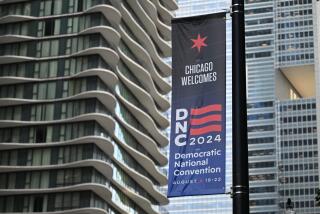Same-Day Primaries : Democratic Plan Targets the South
- Share via
WASHINGTON — Just as Democrats finished adopting rules for their 1988 presidential nominating campaign Saturday with an uncharacteristic lack of acrimony, their attention began to shift to a possible new cause of controversy--a plan to strengthen the voice of the South in the nominating process.
The proposal, actively promoted at the three-day Democratic National Committee meeting here, would bunch Southern state primaries on one date early in the campaign. The net result, Southern proponents of the plan contend, would be the selection of a “centrist” presidential candidate with a good chance of carrying Southern states in November, 1988, and regaining the White House for the party.
In pushing this plan in Southern and border state legislatures, its sponsors are inspired by a “sense of anxiety and frustration,” and a “keen sense of self-preservation,” Tennessee party Chairman Richard Lodge told the national committee’s Southern caucus.
But the South is not the only area where Democrats are disheartened by a nominating process through which their party has picked only one winner in the last five presidential elections. Other regions also feel neglected, and the Southern move to gain influence appeared to be fueling similar efforts in other parts of the country.
California Primary
California party Chairman Betty Smith announced that she is forming a committee of party officials and state legislators to explore the possibility of moving the primary in the nation’s most populous state, customarily last on the nominating calendar, to an earlier date when it might carry more political weight.
“We really haven’t had much attention since Robert Kennedy won our primary in 1968,” Smith said.
Feeling much the same way, some Democrats in the Rocky Mountain states are talking of banding together to set up a regional contest in their area. “We should be talking about a single date,” Montana committeeman Evan Barrett told other members of the Western caucus. In past campaigns, with the Western state primaries and caucuses scattered through the calendar, “the only thing we’ve ever seen is the underside of a campaign plane” as it flies to some other destination, he said.
When asked about his views on the proposed shifts in primaries, national party Chairman Paul G. Kirk Jr. pointed out that the nominating rules leave the states generally free to schedule their primaries at will within a 13-week “window,” from the second Tuesday in March to the second Tuesday in June. And he dismissed concerns that too many primaries might be “front loaded” into the early part of the calendar as “false alarms.”
Potential Problems
Nevertheless, other party leaders see potential problems in the proposed changes. Some say that if the Southern states do succeed in establishing a regional primary, the effect could be the reverse of what the Southerners intend.
Instead of drawing attention away from Iowa and New Hampshire, the first two states on the nominating calendar, critics of the Southern regional primary say it could make them even more important, as candidates strive to succeed there in order to build momentum for the projected multi-state test in the South.
Moreover, instead of benefiting one of several centrist candidates, detractors of the Southern regional primary say it could provide the greatest advantage to the Rev. Jesse Jackson, if the black leader runs again. The centrists’ vote would be divided, this argument goes, while Jackson’s black supporters would form the most solid and largest base in the region.
Also, some party members worry that the pan-Southern scheme could be divisive. “We always argued against regional primaries,” said Lanny Davis of Maryland, an adviser to the 1980 and 1984 rules commissions, “because we think they tend to accentuate divisions between areas of the country.”
Democratic Initiative
Although most of the initiative for the Southern regional primary has come from Democrats, who control the state legislatures in the South, any schedule changes that take place also will affect Republicans.
Among Republican strategists at last weekend’s Southern GOP leadership conference in Nashville, the general feeling was that a Dixie-wide primary would be of greatest benefit to Vice President George Bush, who as the front-runner would have the most resources for running in so many states at once.
But some supporters of former Tennessee Sen. Howard H. Baker Jr. thought his candidacy might be helped by a regional contest in his native area.
The target date for the Southern regional primary is the second Tuesday in March. Already set for that date are primaries in three states that held primaries then in 1984--Florida, Georgia and Alabama--and Kentucky, which recently shifted to that date. Both houses of the Tennessee Legislature voted to climb on the regional bandwagon, and proponents are hopeful that ultimately eight other states, the biggest of which is Texas, will join.
The 1988 nominating rules approved by the Democratic National Committee on Saturday after a year of deliberation by a 50-member party commission made only minor changes in the 1984 rules. Among them were increasing by about 75, to 640, the number of “super delegates” or party and elected officials unpledged to any presidential candidate; reducing the threshold of popular votes required to win delegate votes from 20% to 15%, and allowing certain states with a nonpartisan tradition, notably Wisconsin and Montana, to open their primaries to voters unwilling to declare as Democrats.
More to Read
Get the L.A. Times Politics newsletter
Deeply reported insights into legislation, politics and policy from Sacramento, Washington and beyond. In your inbox twice per week.
You may occasionally receive promotional content from the Los Angeles Times.










